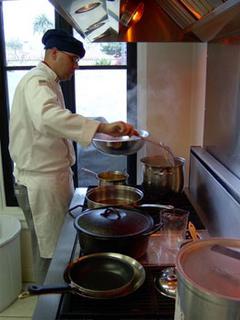Culinary Specialist 1st Class (SW) Brandon Parry became the first Sailor to earn the title of Personal Certified Executive Chef (PCEC) May 13, 2005.
An enlisted aide to Commander, Naval Air Forces (COMNAVAIRFOR), VADM James Zortman, Parry earned the certification after passing the practical exam, a written exam, and nearly a decade of culinary education.
 CS1 (SW) Brandon Parry became the first Sailor to earn the title of Personal Certified Executive Chef (PCEC). Pictured above he is at the stove taking the practical cooking exam for the certification.
CS1 (SW) Brandon Parry became the first Sailor to earn the title of Personal Certified Executive Chef (PCEC). Pictured above he is at the stove taking the practical cooking exam for the certification."It's awesome!" Parry said about earning the qualification. "So far, this is the pinnacle in my culinary career. A lot of people can cook well, but the certification process forces you to learn everything there is to know about being a chef."
According to the American Culinary Federation (ACF), a PCEC is a chef with advanced culinary skills and a minimum of seven years of professional cooking experience, with a minimum of two years as a personal chef. They provide cooking services on a "cook-for-hire basis" to a variety of clients. They are responsible for menu planning and development, marketing, financial management, operational decisions, and providing nutritious, safe, eye-appealing and properly-flavored foods.
The PCEC certification, which the ACF created in 2003, is awarded based on excellence in three areas: education, work experience, and tests.
The education portion includes formal schooling (high school to graduate studies) and continuing education. In addition to these, each candidate must complete food safety, sanitation, nutrition, hospitality and supervisory courses. The work experience portion includes a practical cooking exam where candidates prepare two different three-course menus, while practical examiners and executive chefs observe and critique the candidate's cooking and sanitation skills. The written exam portion includes 100 questions on basic and advanced cooking, sanitation, nutrition, personal chef management, and basic and advanced baking. The test must be completed in one hour with a score of at least 70 percent.
"The [practical] exam can be a little intimidating, because it's outside of the normal type of procedure that we do, but I think CS1 did very well," said Chef Michael Harants, Corporate Chef of the Navy at Naval Supply Systems Command (NAVSUP) and practical examiner.
Parry said that reaching his goal of earning the PCEP qualification was something he has been focused on for several years.
"I have been working for this my whole career," said the 15-year Sailor. "When I first came in, I was 18 and stationed on the USS Independence (CV 62). I was put into the bake shop, baking 3,000 loaves of bread a day. I found out then that I was a natural at cooking. About midway through my career, I decided I wanted the certification, and I had been working for that since then."
According to Parry, being an E-7 to E-8 is a requirement for the qualification, but since he has been performing the job of an E-7, he was able to have that waived. He also said that in order to reach his goal, he had to have ambition and a deep passion for culinary arts.
"CS1 stands out because of his ambition," said Harants. "Culinary certification was one of his career goals, and he did what he needed to do to reach that goal." Harants added that culinary certification is an opportunity for Sailors to validate their skills and knowledge. "The certification application process that a cook or chef has to go through is not just checks in the box. There is a written and a practical exam demonstrating that one is knowledgeable and can apply those skills to everyday duties," he said. "One of the significant factors of certification is the level of professionalism that one demonstrates by going the extra mile."
According to Marylin Burchfield, ACF certification programs coordinator, Parry is not only the first Sailor in the Navy to have the PCEC certification, but he's only the second in the Department of Defense. She said the PCEC certification or any certification, will help people get better jobs and better pay once they reach the civilian sector. They will also have the skills and knowledge to run their own businesses.
"If one wants to take their culinary skills to the next level, then they have to put forth the effort to seek out any additional culinary education they can to excel and set themselves above the rest," said Harants. "The Navy offers CSs several avenues for continuing education in culinary arts. The Adopt-a-Ship program, bringing industry professionals to the CS community, is one way they can open up new culinary experiences. Culinary internship opportunities in the local fleet area can also help one to progress with culinary skills and knowledge."
"I think certification is important to the Navy," Parry said. "It forces people to know the formal aspects and history of cooking. The whole process also forces you to be a good cook, and that is what it's all about, knowing the nitty-gritty of food."
For more information on the certification process or future culinary educational opportunities, contact Chef Michael Harants by e-mail at Michael.Harants@navy.mil.


No comments:
Post a Comment